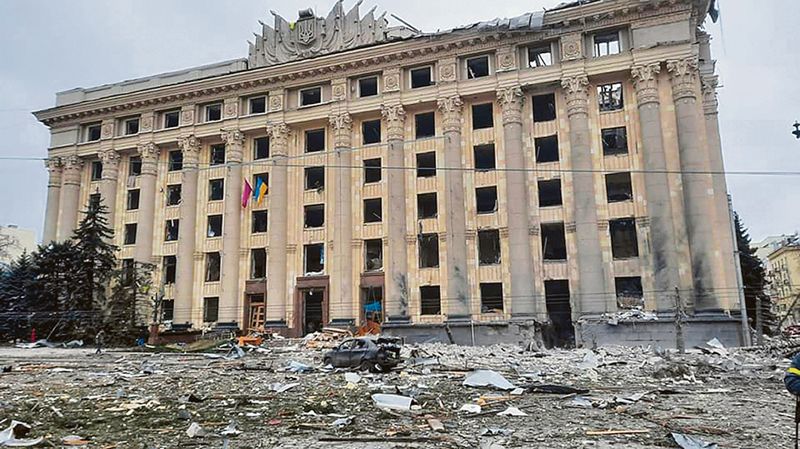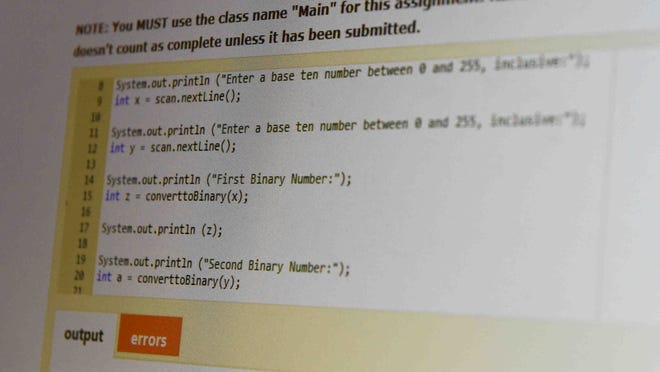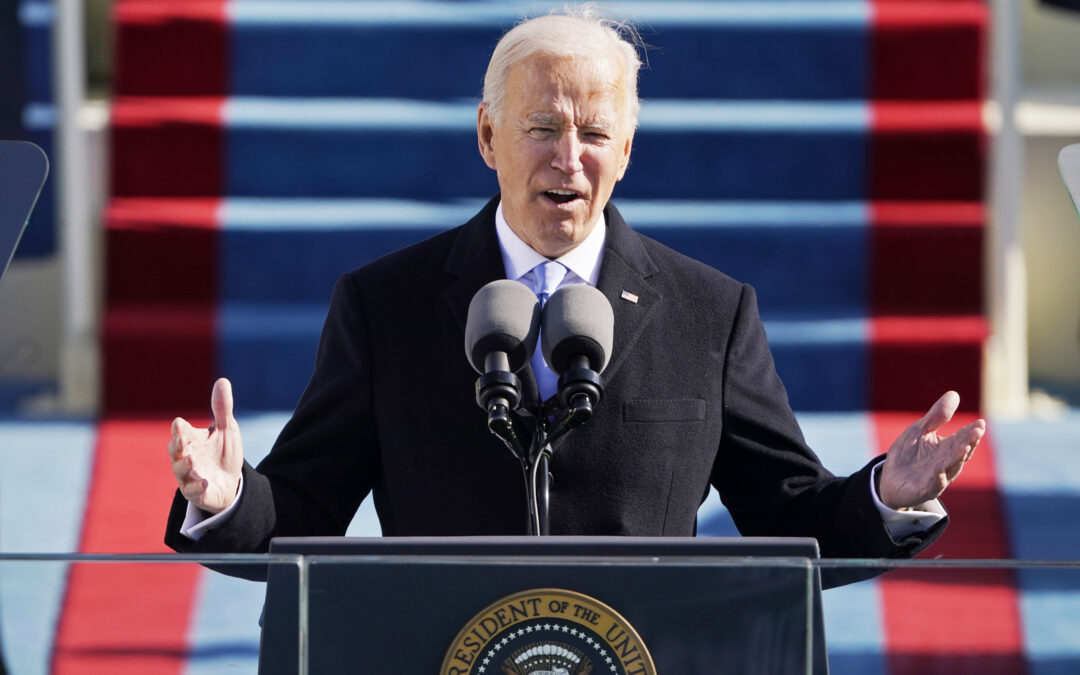
A short story authored by me is in the latest edition of Sirjana.
A short story authored by me is in the latest edition of Sirjana—one of the oldest and best literary magazines of Punjabi. An historic milestone in my writing pilgrimage.

A short story authored by me is in the latest edition of Sirjana—one of the oldest and best literary magazines of Punjabi. An historic milestone in my writing pilgrimage.

When people come to comprehend what Archbishop Desmond Tutu said — “Climate change is a moral challenge, not simply an economic or technological problem” — nature’s stewardship becomes a calling.”
“The world is going up in flames — shower it with Your Mercy, and save it! Save it, and deliver it, by whatever method it takes,” reads a shabad in Guru Granth Sahib, the Sikh scripture. Followers of Sikhism — the world’s fifth-largest independent religion — recite it in disquieting times.
Over the past few years, the pandemic has not been the only reason Sikh congregations — who believe that “Air is the Guru, Water is the Father, and Earth is the Great Mother of all” — sing it devotionally at their gurdwara. The Earth’s rising temperature has also given deeper meaning to Sikhs’ Sunday prayers.
Among the world’s faithful, Sikhs are not alone in their concerns about climate. “The skyrocketing number of books on ecotheologies show that commitment to climate action has entered the mainstream of most religions,” say Tobias Müller and Esra Özyürek of the Netherlands’ University of Groningen. “The research that we’ve done suggests that, by leveraging their massive influence, these groups can help the world take significant steps towards averting climate catastrophe.”
Climate-dedicated organizations or initiatives mirror nearly every faith’s commitment to preempt climate Armageddon. Among the Abrahamic religions, for instance, Dayenu is “a Jewish call to climate action.” The World Council of Churches has “care for creation and justice” at its center, and Muslims have an “Islamic Declaration on Global Climate Change.”
Similar dedication amongst religions born in the Indian subcontinent is reflected by the “Hindu Declaration on Climate Change,” “The Time to Act Is Now: A Buddhist Declaration on Climate Change,” “EcoSikh” and the “Jain Declaration on the Climate Crisis.”
NASA’s scientists have calculated that the average global temperature on Earth has increased by at least 1.1 degrees Celsius (1.9 degrees Fahrenheit) since 1880 and report that the rise has accelerated since 1975, a threatening pace that signals a “code red for humanity.”
The role of religious communities in confronting this upward march to 1.5 degrees Celsius (2.7 degrees Fahrenheit) is crucial.
When people come to comprehend what Archbishop Desmond Tutu said — “Climate change is a moral challenge, not simply an economic or technological problem” — nature’s stewardship becomes a calling.
In 1970s India, the Chipko (hugging) movement ended deforestation in Uttarakhand. Sunderlal Bahuguna, who coined the “ecology is the permanent economy” mantra, was the movement’s most well-known face. He motivated poor villagers, primarily illiterate women with subsistence livelihoods, to confront tree felling to save their hearths, homes and the environment using Gandhian techniques. They took on a solid government forestry department that was colluding with big contractors — and won.
The movement earned its “Chipko” name because villagers hugged and chained themselves to trees to stop loggers from cutting them down. Hugging a tree meant “our bodies before our trees.”
When religious communities pool their resources for a shared cause, their strength grows synergistically. The Rev. Canon Sally Bingham perhaps had this in mind when she founded Interfaith Power & Light (IPL) — “a religious response to global warming” — in 1993. Today, the organization has 40 state chapters and 22,000 congregations. Delaware Interfaith Power & Light (DeIPL) is its affiliate in President Joe Biden’s home state.
The entire IPL community, especially us in Delaware, rejoiced when one of President Biden’s first actions was to reenroll the U.S. in the Paris Agreement. Unfortunately, we have been equally disappointed to see how fossil fuel-funded legislators have repeatedly defeated his ambitious environmental agenda on Capitol Hill.
Guthrie Graves-Fitzsimmons and Maggie Siddiqi of the Center for American Progress wrote, “Faith-based climate activism is deeply rooted at the local level, particularly in communities that bear direct witness to the harms that the climate crisis inflicts on the environment in their immediate surroundings.”
Delaware is a sinking coastal state that is also the lowest-lying in the country. Consequently, the sea level is rising higher and faster. DeIPL and other environmental groups are working together to create awareness about the state’s precarious situation and lobby the government in Dover to declare a climate emergency that reflects “a statewide commitment to a just transition toward a decarbonized economy that invests in and ensures clean energy and quality jobs and reverses the climate crisis.”
President Biden’s party in the First State has a government trifecta, with supermajorities in both chambers and a Democratic governor. While the president’s endeavors in Washington, D.C., continue, he should nudge his colleagues in Dover to turn his home state into an example of environmental excellence he can showcase nationally and internationally.
Perhaps then, we can realize Guru Granth Sahib’s observation: “Air, water, earth and sky — the Lord has made these His home and temple.”
—————
This column was published online by https://baytobaynews.com/ on April 17, 2022.

“If burning fossil fuels was so bad that it threatened our very existence, how could we just continue like before? Why were there no restrictions? Why wasn’t it made illegal?” Greta Thunberg raised these questions during a TED talk speech in 2018.
Greta could send Vladimir Putin a thank-you card for supplying one of the answers.
Putin’s Ukraine invasion was unprovoked and unjust. However, it was neither sudden nor clandestine but marinated over the years in the open because nothing detrimental had happened to Russia or Putin after the Crimea annexation eight years ago. Ironically, the next American president was extra-nice and respectful to Putin, as if the Russian had done America a big favor.
Rex Tillerson, as ExxonMobil CEO, had made Russia and its president richer by betting billions on Russia’s vast but notoriously elusive fossil fuels. A pleased Putin in 2013 conferred on him the Order of Friendship, one of the highest honors Russia gives to foreigners. Trump made Tillerson his secretary of state.
After his days in office, former German Chancellor Gerhard Schroeder continued to be a lobbyist for Russia’s fossil fuels.
Today, the Russian military is killing innocent Ukrainians in their homes because Putin’s aggression over the years has not cost him dearly, instead earning him powerful admirers and kowtowers.
What happened as a result of the assault on Ukraine? Gas prices soared, and oil hit $105 a barrel — the average price in 2020 was $42 and $70 in 2021 — in the aftermath of the full-blown, predawn attack Feb. 24. Was this cost escalation a surprise to Putin or the 90 corporations responsible for an estimated two-thirds of all heat-trapping gas emissions since 1880?
“Unsurprisingly, the companies most responsible for climate change include Saudi Aramco, Chevron, ExxonMobil, BP, Gazprom and National Iranian Oil Co. — companies spread across the Middle East, Europe, Russia and the United States,” as Atula Gupta recently wrote in Stacker. “Coal, oil, and natural gas are produced by 83 of these companies. … The top emitter was China’s state-owned coal and cement production company.”
Why did the world and the institutions put in place after World War II fail to check the rise of another Adolf Hitler in Putin? Especially the West, which has enough reasons to watch this beast with care. Russia’s pretext for attacking Ukraine is the same as was Germany’s in 1939. “The Nazi leader used similar tactics to dismember and devour Czechoslovakia before World War II,” opines Michael E. Ruane in The Washington Post.
Why has he gone unchecked for so long? Think fossil fuels.
“In recent years, the European Union has received nearly 40 percent of its gas and more than a quarter of its oil from Russia,” wrote Patricia Cohen and Stanley Reed in The New York Times. “That energy heats Europe’s homes, powers its factories and fuels its vehicles, while pumping enormous sums of money into the Russian economy. European leaders are caught between wanting to punish Russia for its aggression and to protect their own economies.”
Putin, “the new tsar,” as former Estonian President Toomas Ilves calls him, flagrantly threatened the whole world: “Whoever tries to interfere (in Ukraine) should know that Russia’s response will be immediate and will lead to such consequences that you have never experienced in your history.” That’s how a tyrant addresses the world.
Ukraine’s functioning democracy is a threat to Putin’s style of autocratic administration. Also, Ukraine is one of the major routes for Russian gas flowing to Europe. Putin wouldn’t like to rely on anyone he can’t completely control and manipulate, as he does a few other erstwhile Soviet republics.
Conflicts over fossil fuels aren’t privy to any geography. The fighting for access to these climate-changing greenhouse gases has set the whole planet aflame. Ukraine is the most recent addition to the existing list of countries like Iran, Venezuela, Iraq, Syria, Nigeria, South Sudan and those in the East and South China Seas.
If you think that fossil fuels and the big oil companies have outsized influence only in these developing countries, think again. Remember the lone coal state Democratic senator repeatedly defeating the current U.S. administration’s environmentally friendly initiatives? Is he not imperiling the futures of millions and pushing America towards more pain and suffering?
Those in this country who remain under the control of the fossil fuel industry may not be invading another nation, but they certainly are not doing much to save their own.
—————
This column was published online by https://baytobaynews.com/ on March 05, 2022.

Albert Einstein’s words, ‘I know not with what weapons World War III will be fought, but World War IV will be fought with sticks and stones’ were ricocheting in my mind while speaking on the phone with Vadim, a former classmate and resident of Kyiv. Russian President Putin had recognised the two Russian-supported, separatist-controlled enclaves in eastern Ukraine as sovereign territories just a few hours earlier.
I am concerned for Vadim, his family, his country and the world. Once again, one of the world’s strongest militaries has unleashed terror and destruction on a neighbour at the direction of a diabolical dictator obsessed with regional dominance. Democracy, globally, has been diluted.
Globalism, powered by the Internet and other technological advances, boosted the living standards of populations around the world in the past three decades. Individuals today live healthier, longer and more comfortable lives than their parents and grandparents did. Sadly, a new era of authoritarianism, as painfully demonstrated in the past few days, now threatens vulnerable countries and those who experienced the most significant gains from globalism.
Vadim and I were graduate students in the mid-1990s in the UK, soon after the break-up of the USSR. A bright, well-informed man, he was there with his wife from Belarus on a British scholarship. A few weeks before returning to Punjab, I learned how desperately the couple had repeatedly tried and failed each time to make the host country their permanent home.
When we reconnected on social media several years later, I learned that he and his wife had divorced and he had relocated to Kyiv from Minsk. What he said during our recent phone conversation reminded me of Einstein’s words.
‘Phase-I of this war has been on for the past eight years when they occupied Crimea,’ he told me. ‘At that time, the world was quiet, including America, because Trump was afraid of Putin. Our worries were basic items, like bread, pasta, beer and meat, but not now in phase II, everything is available in abundance because we are a solid agricultural country. We are ready to defend ourselves. The only things now sold out are the guns. But not to worry, we will fight with whatever we can lay our hands on,’ he said.
I have some knowledge about the region that once was the Soviet Union. In my primary, middle and high school years, I read many Moscow-based Progress Publishers’ translated books, cheaply available in Patiala’s Model Town market. Also, I have many friends from the region.
Why Ukraine? Why now? ‘He (Putin) wants to be the god of this part of the world,’ he said. ‘Now, outside Moscow, Russians don’t even have toilets. Through government-controlled media, he tells Russians that Ukraine and its people are responsible for their every pain, suffering and misery.’
Hope this madness ends soon.
—————
This column was published online by https://www.tribuneindia.com/ on March 03, 2022.

Upon landing in the “land of opportunity” 22 years ago, I lost no time in starting a software company in Delaware called Tekstrom, Inc. Since then, Tekstrom has employed hundreds of engineers specializing in software testing methodologies and solutions that serve clients nationally and across our borders.
Americans with a degree in computer science and engineering or otherwise possessing relevant coding skills have been sought after for years because software applications have penetrated the world around us and had a deep impact on our lives. The ever-growing demand for skilled developers here and abroad has resulted in a scarcity of qualified personnel.

AP Computer Science could be a huge boost for students seeking technical skills that many future employers would be interested in.
This need-availability gulf is in no way exclusively an American reality. However, it has hurt us more due to our pioneering and leadership role in the computer software universe. Moreover, it has become clear to me that opportunities in these specialized computing fields are scarcer still in the African-American and Hispanic populations.
Why then have we failed to seal the gap? What are the barriers to their entry?
There are thousands of jobs paying top dollar that remain vacant in the software industry. Take a look at the US labor statistics: By the end of 2020, there were 1.4 million unfilled computer software jobs. Meanwhile, in the U.S. we graduate only 400,000 software specialists each year. Many positions are filled by foreign engineers, particularly by those who, like myself, come from India.
In addition, the pandemic paradoxically has upped the need for software and software workers while the enrollment of computer science undergraduate and graduate degrees students has fallen.
A family’s economic situation may not be responsible for everything in a child’s life, but it certainly has an impact. Many children of economically challenged minority individuals simply don’t have the guidance, network, financial stability and training to enter the software industry.
I decided to take the initiative and create a program that would help minority students enter the computing marketplace. I named it PROGRESS — Producing Real Opportunities by Giving Relevant Education in Software and Systems. Its structure and curriculum were born as a result of the input from many educators, colleagues and friends.
I also felt It was time for us Indian Americans, I told some in my social circle — especially those in the software industry — to give back to America, which has provided us the opportunity to work hard, grow and enrich our lives in many ways. We could make America better and stronger by helping African-American and other underprivileged, underrepresented populations to enter the software industry.
I reached out to colleagues and friends with this message, and they immediately and wholeheartedly agreed to help and contribute to PROGRESS. For instance, Rishi Potdar of Pennsylvania, Rajnikant Swain of Delaware, Dharamvir Dahiya of New Jersey, and Venu Madhav of India have passionately invested many hours during their tutoring sessions over Zoom — no monetary benefit involved.
I am delighted to report that the first 12-week PROGRESS training session ended successfully on Aug. 6. A small cohort of four internees, enrolled from Delaware State University, a historically Black university, after passing a web-based test to assess their learning potential, graduated successfully with the knowledge and hands-on skills presently in demand in the software testing field.
Thanks to Professor Marwan Rasamny, chairperson of DSU’s computer science department, who reviewed and evaluated the scope and intensity of the PROGRESS curriculum, all four graduates scored three academic credits toward their respective degrees. PROGRESS also paid a stipend of a thousand dollars to each student to keep them focused on participating and learning throughout the program.
The significance of much-needed “soft” skills such as resume building, interviewing, and how, when and where to apply for jobs was recognized and factored into PROGRESS as well. Interactions with successful professionals in these areas helped the trainees to understand the industry and career potential.
We also owe a debt of thanks to the corporate sector as well. Over Zoom, the four trainees interacted with and learned from Company Services Corporation Chief Technical Officer Kyle Sturgis, Executive Director of Tech Impact Patrick Callihan, and Syed Fazli, head of Automation Practice for Corelogic in Irvine, California, and former CTO at Bloomberg.
While PROGRESS has started small, we hope to increase the number of participants in each session to a maximum of ten. All internships in the future will remain free of charge,
The initiative would not have taken off without the help of State Sen. Bryan Townsend who introduced me to Rasamny, Kyle Sturgis and Patrick Callihan and encouraged me overall. I am optimistic that once the pandemic is behind us and awareness about the PROGRESS spreads, more academicians, community leaders and software managers will join the initiative.
For more information about PROGRESS or to participate, contact me at charan@tekstrom.com
—————
This column was published online by the https://www.delawareonline.com/ on Sept. 16, 2021.
Print edition was published on Sept. 19, 2021.

The dangerous trend among a disturbingly large group in this country to replace truth, fact and science with accusation, assumption and unsupported opinion is spreading across multiple sectors of American life.
Unwillingness to accept the verifiable results of a legitimate election was the catalyst for the recent attack on the U.S. Capitol. Refusal to wear masks and adhere to proven precautions against COVID-19 enables the spread of the disease. Unfounded — and in some cases outrageou s— claims about coronavirus vaccines will keep many Americans from being protected.
There is certainly nothing new about substituting belief for fact or lies for truth. The world has been doing it for millennia, and it almost always ends badly. One of the longest running recent examples is the denial of climate change as a fact, a reality that is wreaking realtime havoc here and abroad.
According to the National Oceanic and Atmospheric Administration:
“In 2020, there were 22 weather/climate disaster events with losses exceeding $1 billion each to affect the United States. These events included 1 drought event, 13 severe storm events, 7 tropical cyclone events, and 1 wildfire event. Overall, these events resulted in the deaths of 262 people and had significant economic effects on the areas impacted. The 1980–2020 annual average is 7.0 events (CPI-adjusted); the annual average for the most recent 5 years (2016–2020) is 16.2 events (CPI-adjusted).”
The lines on America’s disaster graph are clearly and consistently rising like sea levels everywhere, including in our Delaware. Globally, European climate researchers recently announced that 2020 was the hottest year on record, tied with 2016.
Former President Donald Trump and others, often supported by self-interested and profit-obsessed billionaires and corporations, have used their pulpits to deny climate change and to label its science as “fake.” One short sample of Trump tweets on climate change: “The concept of global warming was created by and for the Chinese in order to make U.S. manufacturing non-competitive.”
Bill Gates, a billionaire who is using much of his fortune to help solve problems around the world, sees a similarity between the effects of COVID-19 and climate change: “If you want to understand the kind of damage that climate change will inflict, look at COVID-19 and spread the pain out over a much longer period of time. The loss of life and economic misery caused by this pandemic are on par with what will happen regularly if we do not eliminate the world’s carbon emissions.”
Locally, Delaware Interfaith Power and Light (delawareIPL.org), a non-profit, is working diligently through faith communities and partners to address both the causes and consequences of climate change, which they consider to be “the defining moral issue of our times.”
According to Lisa Locke, Director of Programs, “The greatest and most imminent threats, as we’ve already seen, are to low-income, the young and the elderly, and communities of color, who are often most vulnerable to the impacts, least prepared to withstand the effects, and least responsible for their causes.”
Delaware Senate Environmental & Energy Chair Stephanie Hansen told me: “As a low-lying state, the impact of sea level rise driven, at least in part, by climate change is felt dramatically by our residents not only in our coastal areas by the loss of land, structures, and infrastructure such as roadways, but inland as well with the increase in the height of the water table. The increase in the height of the water table leads to flooding, structure damage, and the loss of agricultural land among many other things.”
These are verifiable facts, not opinion.
We know that faith can move mountains. We also know that, unbridled and untested, it can distort people’s thinking in damaging ways and blind their ability to reason.

President-elect Joe Biden and his wife, Jill Biden, board a plane at New Castle Airport, Tuesday, Jan. 19, 2021, near New Castle.
In my own neighborhood — just north of the Delaware and Chesapeake Canal, a family has been using their home twice weekly to hold what they describe as church services. Many men, women and children, ignoring rules against large gatherings, have attended these services, sitting cozily next to each other without any masks. The routine continues even after one of the leaders died of COVID-19.
Rep. Eric Morrison, a newly elected legislator from the area, who has been working to stop it, said, “First, it is a violation of county code. Second, they are flagrantly defying the orders of the governor regarding Covid and public health.”
The behavior of this group is not altogether surprising nor limited to my neighborhood. Just look at the members of Congress who refused to wear masks during their confinement at the Capitol while under siege by insurgents. Shortly thereafter, several people who shared their space contracted COVID-19.
Whether it is dealing with a human pandemic or the physical fate of our planet, it is painfully obvious that a refusal to accept fact and science usually brings tragic results. So, when President Joe Biden says he wants to restore the soul of America, let’s not forget to bring the mind along with it.
—————
This column was published online by the https://www.delawareonline.com/ on Feb. 05, 2021.
Recent Comments